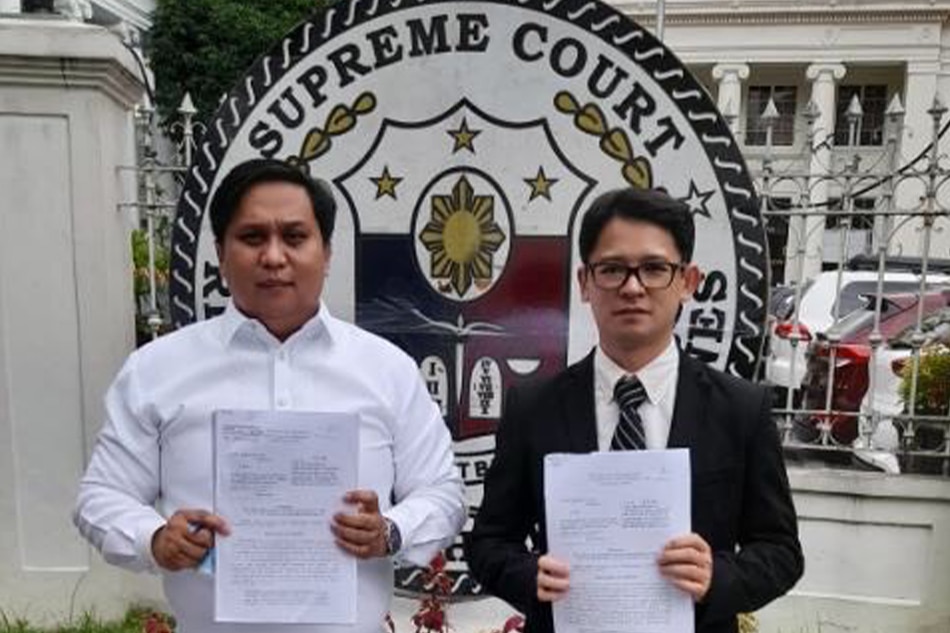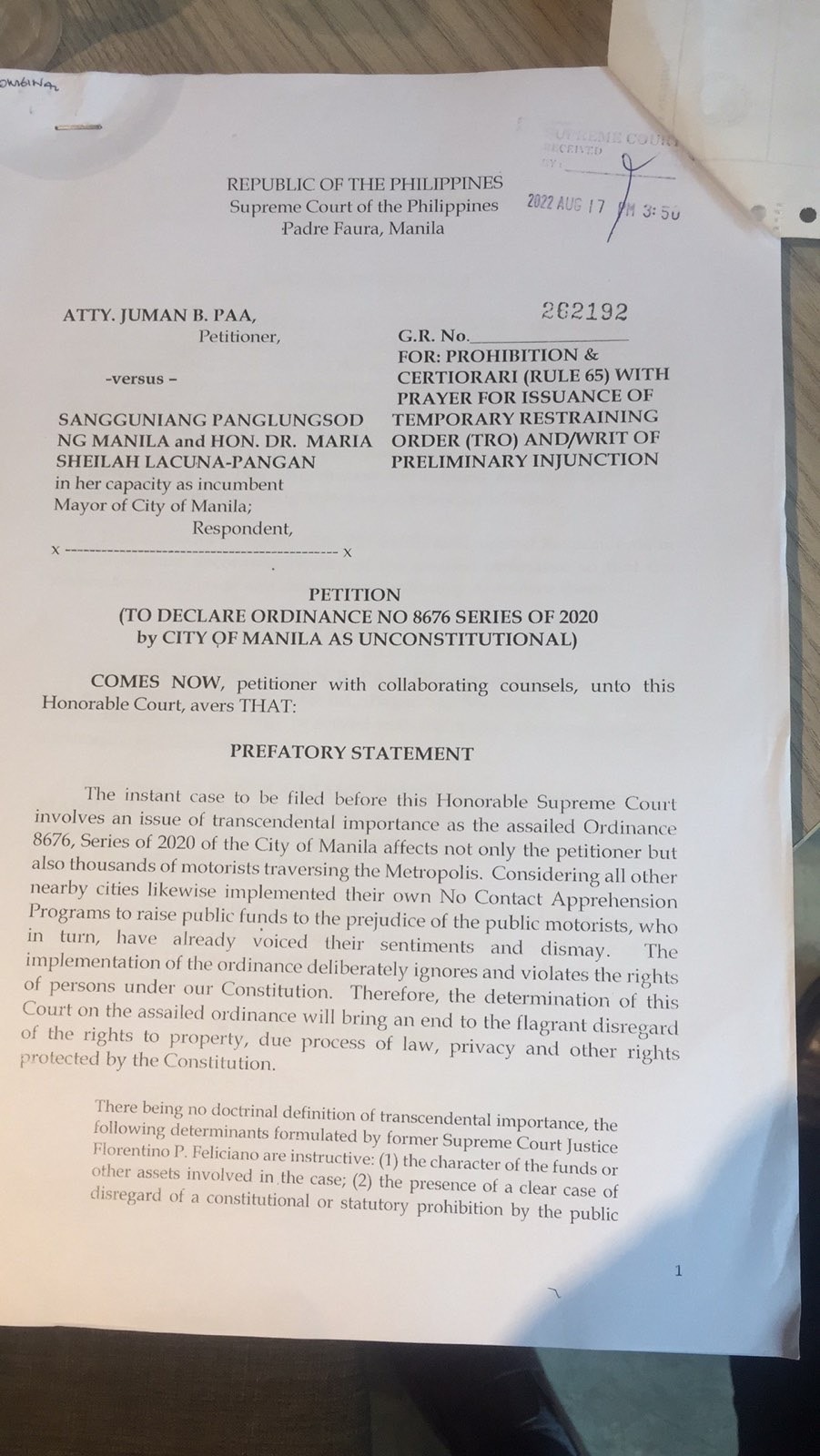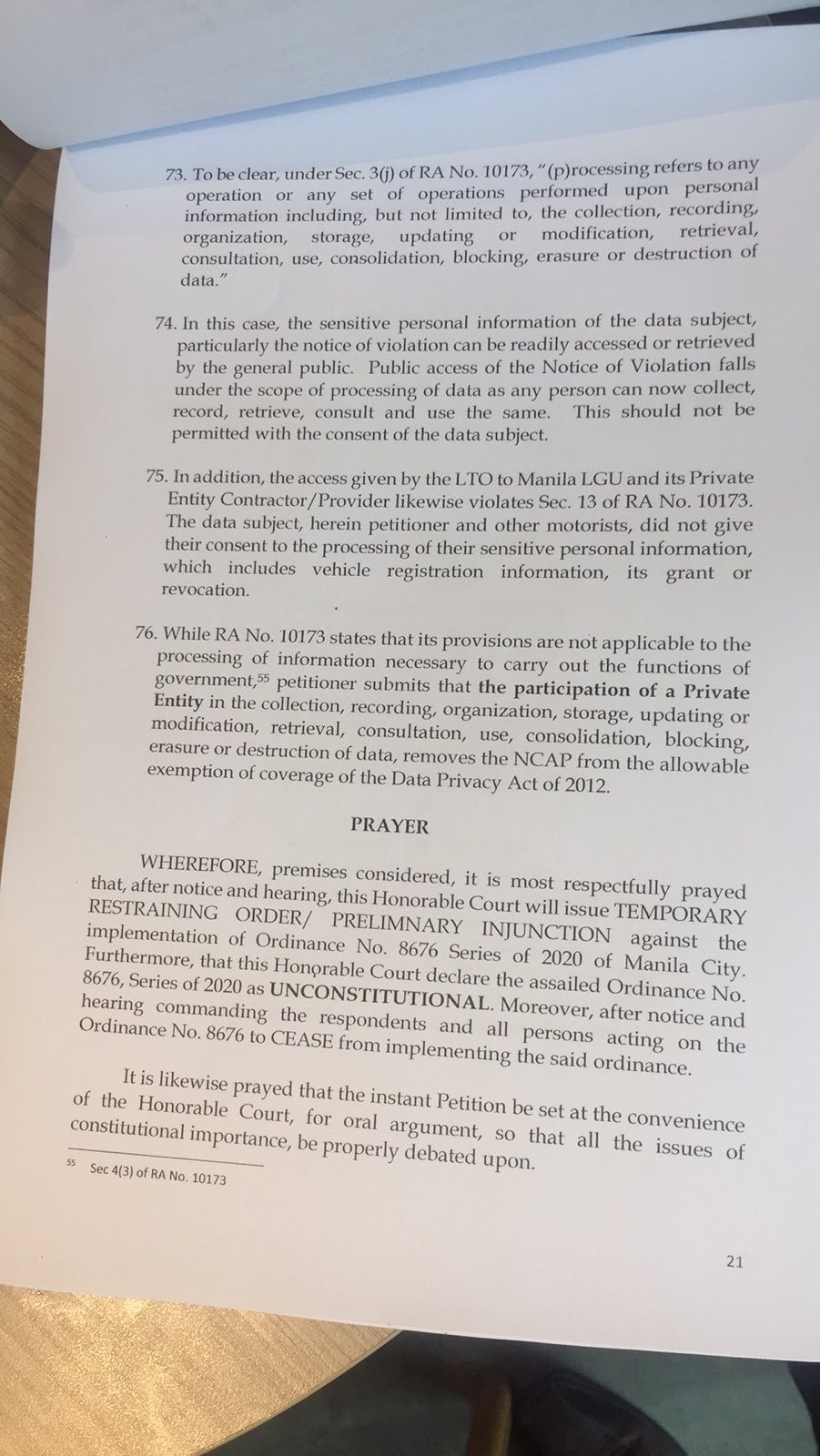Fined P20-K, lawyer challenges Manila’s 'no-contact apprehension' program before SC | ABS-CBN

Welcome, Kapamilya! We use cookies to improve your browsing experience. Continuing to use this site means you agree to our use of cookies. Tell me more!
Fined P20-K, lawyer challenges Manila’s 'no-contact apprehension' program before SC
Fined P20-K, lawyer challenges Manila’s 'no-contact apprehension' program before SC
Mike Navallo,
ABS-CBN News
Published Aug 17, 2022 11:48 PM PHT
MANILA — A lawyer who was fined P20,000 for alleged traffic violations filed on Wednesday yet another petition before the Supreme Court challenging the implementation of the "no-contact apprehension" program.
MANILA — A lawyer who was fined P20,000 for alleged traffic violations filed on Wednesday yet another petition before the Supreme Court challenging the implementation of the "no-contact apprehension" program.
Lawyer Juman Paa asked the high court to declare unconstitutional and halt the enforcement of Ordinance No. 8676 enacted in 2020 by the Manila City Council.
Lawyer Juman Paa asked the high court to declare unconstitutional and halt the enforcement of Ordinance No. 8676 enacted in 2020 by the Manila City Council.
The ordinance, first implemented in December 2020, allows the Manila Traffic and Parking Bureau (MTPB) to fine traffic violators who are caught on traffic enforcement cameras without the physical apprehension by a traffic enforcer.
The ordinance, first implemented in December 2020, allows the Manila Traffic and Parking Bureau (MTPB) to fine traffic violators who are caught on traffic enforcement cameras without the physical apprehension by a traffic enforcer.
Paa, a resident of Manila, said he was supposed to register his SUV in Quezon City in June this year but was told he needed to pay first with the City of Manila fines amounting to P20,360.
Paa, a resident of Manila, said he was supposed to register his SUV in Quezon City in June this year but was told he needed to pay first with the City of Manila fines amounting to P20,360.
ADVERTISEMENT
The fines were based on 4 traffic violations for obstruction of the pedestrian lane from May to July 2021.
The fines were based on 4 traffic violations for obstruction of the pedestrian lane from May to July 2021.
He was charged P2,000 for the first offense, P3,000 for the second offense and P4,000 each for the third and fourth offenses.
He was charged P2,000 for the first offense, P3,000 for the second offense and P4,000 each for the third and fourth offenses.
But the penalties for non-payment amounted to P7,360.
But the penalties for non-payment amounted to P7,360.
Paa paid the fines, interests and surcharges in protest but insisted he did not receive any notice of violations.
Paa paid the fines, interests and surcharges in protest but insisted he did not receive any notice of violations.
He argued he shouldn’t be charged for surcharges and other interests because the MTPB failed to inform him of his first violation.
He argued he shouldn’t be charged for surcharges and other interests because the MTPB failed to inform him of his first violation.
ADVERTISEMENT
It turned out the notice of violations were inadvertently sent to Taguig instead of his residence in Manila.
It turned out the notice of violations were inadvertently sent to Taguig instead of his residence in Manila.
Claiming personal and direct injury, Paa said his right to due process was violated by the ordinance because “he had absolutely no opportunity to lodge his protest to the traffic enforcer…or to comply with the 10-day administrative protest outlined in the assailed ordinance.”
Claiming personal and direct injury, Paa said his right to due process was violated by the ordinance because “he had absolutely no opportunity to lodge his protest to the traffic enforcer…or to comply with the 10-day administrative protest outlined in the assailed ordinance.”
“[H]aving received the notices of violation in July 1, 2022, it is the height of unreasonableness to expect that petitioner could remember and iterate specific circumstances surrounding the alleged traffic violations captured in 2021, to support a meaningful defense or protest,” he said.
“[H]aving received the notices of violation in July 1, 2022, it is the height of unreasonableness to expect that petitioner could remember and iterate specific circumstances surrounding the alleged traffic violations captured in 2021, to support a meaningful defense or protest,” he said.
He added, the ordinance is “unfair and oppressive” because it penalizes the owner of the vehicle and not the driver.
He added, the ordinance is “unfair and oppressive” because it penalizes the owner of the vehicle and not the driver.
He also pointed out, the Manila ordinance imposes “unreasonably higher” fines compared to the Metropolitan Manila Development Authority (MMDA) and the Land Transportation Office (LTO).
He also pointed out, the Manila ordinance imposes “unreasonably higher” fines compared to the Metropolitan Manila Development Authority (MMDA) and the Land Transportation Office (LTO).
ADVERTISEMENT
The penalty under the ordinance for obstruction of a pedestrian lane ranges from P2,000 for the first offense to P4,000 for the third offense while the MMDA and LTO only impose a P1,000-fine for the same traffic violation regardless of how many times it had been previously committed.
The penalty under the ordinance for obstruction of a pedestrian lane ranges from P2,000 for the first offense to P4,000 for the third offense while the MMDA and LTO only impose a P1,000-fine for the same traffic violation regardless of how many times it had been previously committed.
“Worst, the interest and penalties for the delay in settling the violations was way higher than the usual prevailing interest rate of 12% a year,” he said.
“Worst, the interest and penalties for the delay in settling the violations was way higher than the usual prevailing interest rate of 12% a year,” he said.
Paa also alleged the ordinance violates the right to privacy because it appears that anyone who enters the plate number of a vehicle on Manila City’s website would be able to see the number of traffic violations committed including personal details such as the name of the vehicle owner, address and details of the vehicle.
Paa also alleged the ordinance violates the right to privacy because it appears that anyone who enters the plate number of a vehicle on Manila City’s website would be able to see the number of traffic violations committed including personal details such as the name of the vehicle owner, address and details of the vehicle.
He noted that there are no details available as to how the City of Manila operates its no-contact apprehension program, expressing concern that if a private company has been engaged, it might have access to CCTV footage that might be used for surveillance or other purposes.
He noted that there are no details available as to how the City of Manila operates its no-contact apprehension program, expressing concern that if a private company has been engaged, it might have access to CCTV footage that might be used for surveillance or other purposes.
“The lack of security protocols in the NCAP website of the City of Manila places the registered owner in a maligning and humiliating situation. Worse, it can be used by criminals who might poise as public officers and threaten the vehicle owners with their NCAP violations which would result to extortion or corruption,” he said.
“The lack of security protocols in the NCAP website of the City of Manila places the registered owner in a maligning and humiliating situation. Worse, it can be used by criminals who might poise as public officers and threaten the vehicle owners with their NCAP violations which would result to extortion or corruption,” he said.
ADVERTISEMENT
“Furthermore, consent of the registered owners was not secured prior to the operation of the website. This means that the information obtained by the City of Manila from the database of the LTO and used in the NCAP website of the City of Manila is illegal and violative of the right to data privacy,” he added.
“Furthermore, consent of the registered owners was not secured prior to the operation of the website. This means that the information obtained by the City of Manila from the database of the LTO and used in the NCAP website of the City of Manila is illegal and violative of the right to data privacy,” he added.
Paa urged the Supreme Court to issue a temporary restraining order (TRO) to immediately stop the implementation of the ordinance.
Paa urged the Supreme Court to issue a temporary restraining order (TRO) to immediately stop the implementation of the ordinance.
Aside from the Manila City Council, Manila Mayor Maria Sheilah “Honey Lacuna” Lacuna-Pangan was also named as respondent.
Aside from the Manila City Council, Manila Mayor Maria Sheilah “Honey Lacuna” Lacuna-Pangan was also named as respondent.
Transport groups earlier filed a petition against the LTO and the LGUs of Manila, Quezon City, Valenzuela, Parañaque City and Muntinlupa City over their respective no-contact apprehension programs.
Transport groups earlier filed a petition against the LTO and the LGUs of Manila, Quezon City, Valenzuela, Parañaque City and Muntinlupa City over their respective no-contact apprehension programs.
ADVERTISEMENT
ADVERTISEMENT




